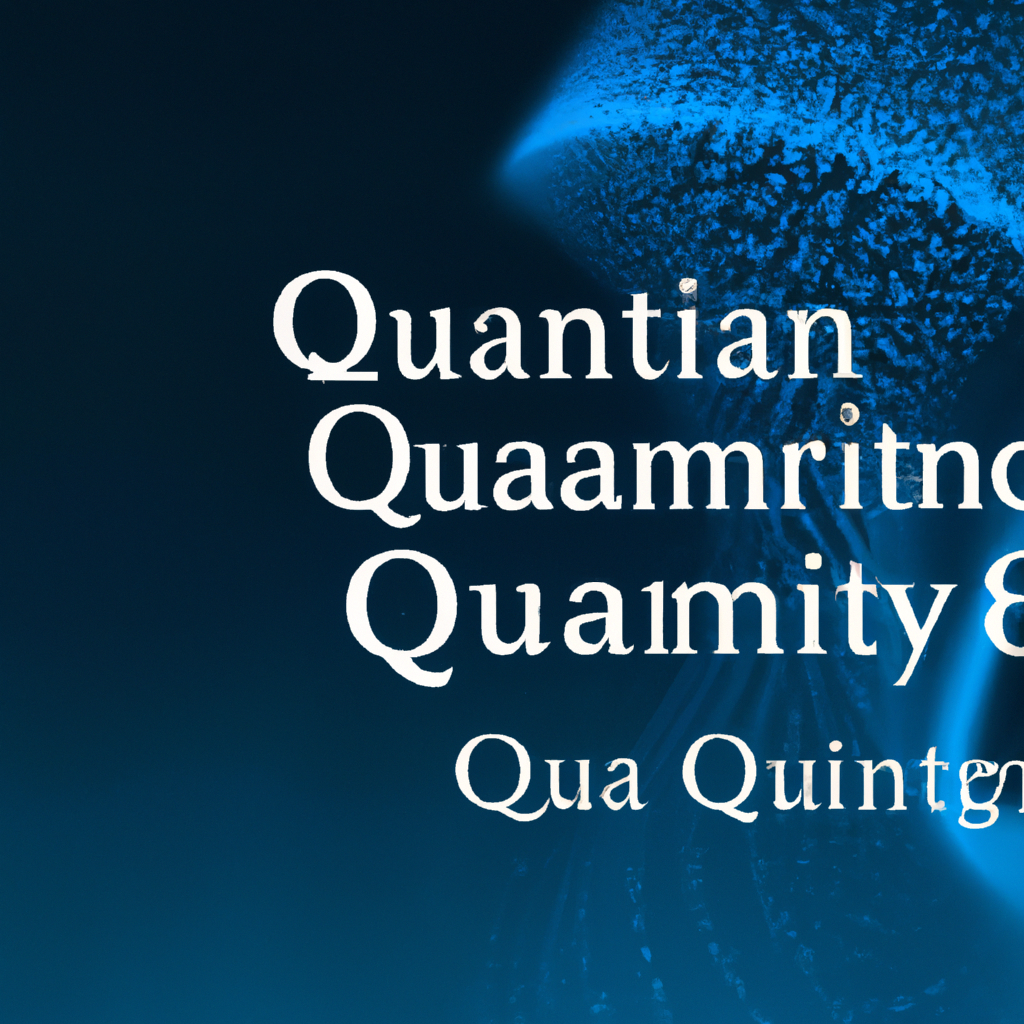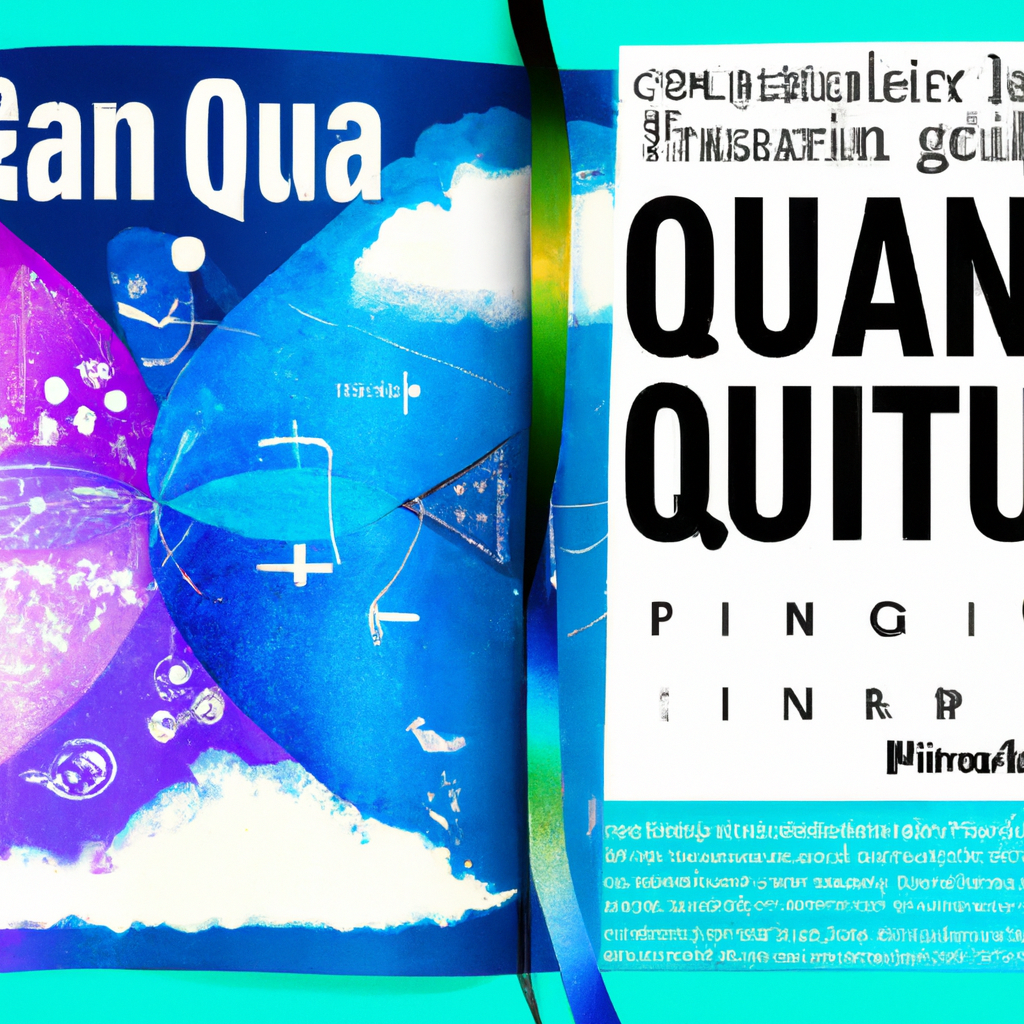Are you ready to embark on a thrilling journey into the fascinating world of quantum computing? Look no further than Azure Quantum, a groundbreaking platform that revolutionizes the way we approach this cutting-edge technology. In this article, prepare to be immersed in the realm of Azure Quantum, gaining insight into its infinite potential, and discovering how it paves the way for the future of computing. Get ready to witness the unfolding of an extraordinary technological advancement that holds the key to unlocking the enigmas of the universe. Brace yourself for a captivating exploration into the universe of Azure Quantum: The Future of Quantum Computing.

What is Azure Quantum?
A brief overview of Azure Quantum
Azure Quantum is a cutting-edge cloud computing platform provided by Microsoft that enables developers and researchers to harness the power of quantum computing. By combining quantum hardware and software with the scalability and flexibility of Azure, Azure Quantum aims to expedite the development and deployment of quantum solutions.
Features and capabilities of Azure Quantum
Azure Quantum provides a range of features and capabilities that facilitate quantum computing experiments and applications. One key feature is the Quantum Development Kit, which includes tools, simulators, and libraries for writing, testing, and debugging quantum programs. The Quantum Development Kit supports programming languages such as Q#, Python, and .NET.
Azure Quantum also offers access to a quantum simulator, allowing users to simulate and validate their quantum algorithms before running them on real quantum hardware. This capability significantly reduces the time and cost associated with developing and testing quantum applications.
Furthermore, Azure Quantum provides a platform for researchers and developers to collaborate and share their quantum expertise. It offers resources and support to foster a vibrant community of quantum enthusiasts, encouraging innovation and knowledge-sharing.
Integration with Azure services
One of the key advantages of Azure Quantum is its seamless integration with other Azure services. Users can take advantage of Azure’s extensive suite of services, including storage, AI, machine learning, and analytics, to enhance their quantum computing workflows. This integration allows for the seamless integration of quantum computing algorithms with classical computing techniques, enabling hybrid solutions that leverage the strengths of both paradigms.
Azure Quantum also takes advantage of Azure’s security features, ensuring the confidentiality and integrity of quantum applications and data. With Azure’s robust security infrastructure, users can trust that their quantum computing experiments and applications are protected against unauthorized access and cyber threats.
Understanding Quantum Computing
Basic principles of quantum computing
Quantum computing is a revolutionary paradigm that leverages the principles of quantum mechanics to perform computations in a fundamentally different way than classical computing. At its core, quantum computing utilizes quantum bits, or qubits, which can represent both 0 and 1 simultaneously, thanks to a property called superposition. This ability for qubits to exist in multiple states simultaneously forms the foundation of quantum computing’s power and potential.
Difference between classical and quantum computing
The key difference between classical and quantum computing lies in the way information is processed. Classical computers represent information using bits, which can only be in one state at a time, either 0 or 1. Quantum computers, on the other hand, harness the power of qubits, which can exist in a superposition of 0 and 1 states. This property of superposition allows quantum computers to perform multiple computations simultaneously, leading to exponential speedups for certain types of problems.
Quantum bits (qubits) and their properties
Qubits are the building blocks of quantum computing, and they differ from classical bits in several ways. In addition to their ability to exist in superposition, qubits possess another fundamental property called entanglement. Entanglement enables qubits to be linked together in a way that the state of one qubit can instantaneously affect the state of another, regardless of the distance between them. This property allows for the creation of highly correlated and interconnected quantum systems, leading to increased computational power.
Qubits are also highly susceptible to errors and decoherence due to environmental factors. Consequently, maintaining the stability and coherence of qubits is a major challenge in quantum computing. Researchers and engineers work tirelessly to develop error correction techniques and improve the quality of qubits to overcome these challenges and build reliable quantum systems.

Quantum Hardware and Software
Overview of quantum hardware
Quantum hardware refers to the physical devices and components that enable the execution of quantum computations. These devices comprise qubits, control electronics, measurement systems, and cooling mechanisms to maintain the necessary low temperatures for quantum operations. Quantum hardware can be divided into two broad categories: analog and digital.
Analog quantum hardware, such as superconducting circuits and trapped ions, focuses on manipulating continuous variables to perform computations. On the other hand, digital quantum hardware, such as topological qubits and spin qubits, relies on discrete quantum states and gates to process information. The choice of quantum hardware depends on factors such as qubit stability, scalability, and error rates.
Types of quantum processors
Quantum processors are the heart of quantum computers, and they come in various forms, each with its own strengths and limitations. Some of the most widely known types of quantum processors include superconducting qubits, trapped ion qubits, topological qubits, and spin qubits.
Superconducting qubits are made from superconducting circuits and offer the advantage of scalability and relatively easy control. Trapped ion qubits, which utilize ions to store and manipulate quantum information, excel in terms of coherence and error rates. Topological qubits, inspired by the field of topology, aim to minimize the impact of noise and errors. Lastly, spin qubits use the spin of electrons or nuclei to represent and manipulate quantum states, and they hold promise for scalability and long coherence times.
Challenges in building and maintaining quantum hardware
Building and maintaining quantum hardware is a highly complex and challenging task. One of the primary challenges is achieving a sufficient number of high-quality qubits that are stable and coherent over long periods. Noise and interactions with the environment can cause qubits to lose their quantum properties, leading to errors in computations.
Another challenge is achieving fault-tolerance and error correction, as quantum systems are highly susceptible to errors due to external disturbances. Building reliable quantum systems that can handle errors and maintain the integrity of computations requires innovative engineering solutions and advancements in materials science.
Furthermore, scaling quantum processors to a large number of qubits is a significant challenge. The more qubits a quantum computer has, the more error-prone it becomes. Overcoming these challenges requires advancements in fabrication techniques, as well as improvements in error correction algorithms and quantum control methods.
Introduction to quantum software development
Quantum software development involves writing, testing, and optimizing algorithms that can run on quantum computers. Developing quantum software requires specialized knowledge and tools that leverage quantum programming languages such as Q#, Python, or .NET.
Quantum algorithms are designed to exploit the unique capabilities of quantum computers to solve problems more efficiently than classical algorithms. Examples of notable quantum algorithms include Shor’s algorithm for factoring large numbers exponentially faster than classical algorithms, and Grover’s algorithm for searching unsorted databases with a quadratic speedup compared to classical search algorithms.
Quantum software development also encompasses techniques for optimizing quantum algorithms, as well as developing error correction codes and protocols to mitigate the impact of noise and errors on quantum computations.
Applications of Quantum Computing
Advancements in cryptography and data security
Quantum computing holds the potential to revolutionize cryptography and data security. With the advent of powerful quantum computers, certain encryption algorithms currently used to secure sensitive information will become vulnerable to quantum attacks. However, quantum computing also enables the development and deployment of quantum-resistant encryption algorithms that can withstand attacks from quantum computers.
Quantum-resistant encryption algorithms leverage the unique properties of quantum mechanics to provide truly secure communication. These algorithms are designed to be computationally hard for quantum computers to solve, ensuring the confidentiality and integrity of sensitive information in a post-quantum world.
Optimization and simulation problems
Quantum computing has the ability to significantly impact optimization problems, which are prevalent in various fields, including logistics, finance, and manufacturing. Quantum algorithms such as the Quantum Approximate Optimization Algorithm (QAOA) and the Quantum Integer Programming Algorithm (QIPA) offer the potential for exponential speedups in solving complex optimization problems.
Simulation problems, such as molecular simulations and quantum chemistry, can also benefit from quantum computing. Quantum simulators and quantum processors have the potential to model and simulate quantum systems with much higher accuracy and efficiency than classical computers. This capability can revolutionize drug discovery, materials science, and the understanding of quantum phenomena.
Machine learning and artificial intelligence
Quantum computing has the potential to transform machine learning and artificial intelligence by providing advanced computational capabilities for data processing and analysis. Quantum machine learning algorithms, such as the Quantum Support Vector Machine (QSVM) and Variational Quantum Classifier (VQC), offer the potential to outperform classical machine learning algorithms in certain scenarios.
Additionally, quantum computing can enhance the training of machine learning models through techniques such as quantum-enhanced feature extraction and optimization. These advancements in quantum machine learning can have wide-ranging applications in fields such as finance, healthcare, and image recognition.
Drug discovery and molecular modeling
Quantum computing can play a crucial role in accelerating drug discovery and molecular modeling processes. Quantum computers have the potential to accurately simulate the behavior of complex molecules and chemical reactions, providing insights into drug interactions and designing new drugs with specific properties.
By leveraging the immense computational power of quantum computers, researchers can explore a larger chemical space, analyze drug-target interactions, and optimize molecular structures. This can significantly expedite the drug discovery process and lead to the development of more effective and personalized therapies for various diseases.

Azure Quantum Services
Azure Quantum Workspace
Azure Quantum Workspace is a comprehensive cloud-based environment that allows users to manage, develop, and execute quantum solutions. It provides a unified interface to access various Azure Quantum services and resources, making it easier for researchers and developers to collaborate and experiment with quantum computing.
The Azure Quantum Workspace offers a user-friendly interface where users can write, debug, and test quantum programs using languages such as Q#, Python, or .NET. It also provides access to simulators and real quantum hardware for running quantum experiments and applications.
Azure Quantum Development Kit
The Azure Quantum Development Kit is a powerful toolkit that equips developers with the necessary tools and resources to build quantum solutions. It includes a quantum programming language called Q#, which enables developers to write quantum algorithms and applications.
The Quantum Development Kit also provides a set of libraries, simulators, and development tools to facilitate quantum software development. Developers can leverage these resources to build, test, and optimize quantum programs before deploying them on real quantum hardware.
Quantum simulator and hardware access
Azure Quantum provides access to both a quantum simulator and real quantum hardware. The quantum simulator allows users to run quantum programs and simulations on a classical computer, providing a cost-effective way to test and validate quantum algorithms before running them on actual quantum hardware.
Additionally, Azure Quantum offers the ability to access and utilize real quantum hardware. Users can submit their quantum programs to the Azure Quantum platform, which then allocates the appropriate quantum resources to execute the programs on physical quantum processors. This access to real quantum hardware enables users to evaluate the performance and potential impact of their quantum solutions in a real-world computing environment.
Quantum-inspired optimization
Azure Quantum also features quantum-inspired optimization, which leverages concepts and techniques from quantum computing to solve optimization problems on classical hardware. Quantum-inspired optimization algorithms, such as the Quantum-inspired Tabu Search and Quantum-inspired Simulated Annealing, offer the potential for improved performance and more efficient exploration of solution spaces.
With Azure Quantum’s quantum-inspired optimization capabilities, users can tackle complex optimization problems across various industries, such as supply chain management, financial portfolio optimization, and resource allocation.
Partnerships and Collaborations
Microsoft’s collaboration with leading quantum hardware providers
Microsoft has forged partnerships and collaborations with leading quantum hardware providers to advance the field of quantum computing. These collaborations enable Microsoft to leverage the expertise and technologies of companies such as IonQ, Honeywell Quantum Solutions, and QCI to facilitate the development and deployment of quantum solutions on Azure Quantum.
By collaborating with quantum hardware providers, Microsoft aims to accelerate the progress in quantum hardware development, improve the quality and performance of quantum processors, and expand the accessibility of quantum computing to a broader audience.
Integration of third-party quantum software and libraries
Azure Quantum encourages the integration of third-party quantum software and libraries, enabling researchers and developers to leverage a wide range of advanced tools and resources. By allowing the integration of software and libraries developed by other organizations, Azure Quantum fosters a collaborative environment that promotes innovation and knowledge-sharing.
Researchers and developers can take advantage of popular quantum software frameworks, libraries, and open-source projects to enhance their quantum computing workflows. This integration allows for the utilization of state-of-the-art algorithms, simulation techniques, and error correction codes developed by the quantum community.
Quantum research initiatives and partnerships
Microsoft is actively involved in quantum research initiatives and partnerships to advance the state of quantum computing. Through collaborations with academic institutions, research organizations, and quantum startups, Microsoft aims to drive innovations in quantum algorithms, error correction techniques, and applications.
By supporting and participating in quantum research initiatives, Microsoft contributes to the growth of the broader quantum computing ecosystem, promotes knowledge-sharing, and helps identify new avenues for exploiting the power of quantum computing.

Real-World Use Cases
Case studies of organizations leveraging Azure Quantum
Azure Quantum has already empowered numerous organizations across various industries to explore the potential of quantum computing and develop quantum solutions. One such organization is a pharmaceutical company that used Azure Quantum to accelerate the discovery of new drug candidates by simulating the behavior of complex molecules.
Another case study involves a logistics company that utilized Azure Quantum to optimize its supply chain and transportation routes, leading to significant cost savings and improved delivery efficiency. These real-world examples demonstrate the immense potential of quantum computing in solving complex problems and driving innovation.
Success stories in diverse industries
Azure Quantum has impacted diverse industries, offering transformative solutions to long-standing challenges. In finance, Azure Quantum has helped optimize investment portfolios and mitigate financial risks by leveraging quantum optimization algorithms.
In the energy sector, Azure Quantum has contributed to optimizing power grids, facilitating energy distribution, and enabling the development of sustainable energy sources. Additionally, in the agriculture industry, quantum computing has been utilized to model and optimize crop yield, reducing resource consumption and improving agricultural sustainability.
These success stories highlight the growing impact of Azure Quantum in various sectors, signaling a shift towards a future where quantum computing will revolutionize traditional industries.
Quantum computing impact on various sectors
Quantum computing has the potential to transform multiple sectors by addressing complex problems that are currently challenging to solve with classical computing alone. In healthcare, quantum computing can contribute to personalized medicine by accelerating drug discovery and optimizing treatment plans.
In the automotive industry, quantum computing can assist in optimizing traffic flow, improving vehicle safety, and enhancing self-driving technology. Furthermore, quantum computing can revolutionize the field of materials science by facilitating the design and discovery of new materials with desired properties, enabling breakthroughs in energy storage, electronics, and aerospace.
With its broad-ranging impact on various sectors, quantum computing holds the promise of driving technological advancements and shaping the future of many industries.
Security and Ethical Considerations
Quantum-resistant encryption algorithms
Although quantum computing offers immense computational power, it also poses security risks to classical encryption algorithms. Many of the widely used cryptographic algorithms, such as RSA and ECC, are vulnerable to quantum attacks.
To address this concern, research and development efforts are focused on designing and implementing quantum-resistant encryption algorithms. These cryptographic algorithms leverage the unique properties of quantum mechanics to provide secure communication and protect sensitive information from quantum attacks. Investments in quantum-resistant encryption are essential to ensuring the long-term security of data in a quantum-powered world.
Potential risks and vulnerabilities
As quantum computing continues to advance, it also introduces new risks and vulnerabilities. Quantum computers have the potential to crack currently secure encryption algorithms, rendering sensitive data vulnerable to unauthorized access.
Additionally, the immense computational power of quantum computers can be exploited for malicious purposes such as breaking cryptographic protocols, compromising secure systems, or tampering with financial transactions. It is crucial to carefully evaluate and address these risks to ensure the secure adoption and deployment of quantum computing technologies.
Ethical implications of quantum computing
The rapid advancement of quantum computing poses ethical implications that must be considered. As quantum computing progresses, it is important to ensure equal access and prevent a digital divide, ensuring that the benefits and opportunities associated with quantum computing are accessible to all.
Furthermore, the development and deployment of quantum technologies should be guided by ethical principles and considerations. Organizations should prioritize transparency, fairness, privacy, and accountability when developing quantum computing solutions to avoid unintended consequences or misuse of the technology.
Ethical frameworks and regulations must be established to govern the development, deployment, and usage of quantum computing technologies, ensuring that they are aligned with societal values and contribute to the common good.

Future Trends and Outlook
Advancements in quantum hardware and software
The field of quantum computing is rapidly evolving, with continuous advancements in both quantum hardware and software. The number of qubits in quantum processors is expected to increase significantly, opening up new possibilities for tackling larger and more complex problems.
Advancements in error correction techniques and noise mitigation strategies will enhance the reliability and scalability of quantum systems. Additionally, quantum software development tools, libraries, and algorithms will continue to improve, making it easier for developers to leverage the potential of quantum computing.
Potential applications and industry disruptions
As quantum computing matures and becomes more accessible, its potential applications will expand across various sectors. Industries such as finance, healthcare, energy, logistics, and materials science are likely to experience significant disruptions as quantum solutions are developed and deployed.
Quantum computing can tackle optimization problems, accelerate simulations, enhance machine learning capabilities, and revolutionize cryptography. As more organizations embrace quantum computing, we can expect to see advancements and innovations that were previously unimaginable.
The roadmap for Azure Quantum
Microsoft’s Azure Quantum is well-positioned to drive the future of quantum computing. Microsoft’s ongoing collaborations with leading quantum hardware providers, research institutions, and the quantum community demonstrate its commitment to quantum computing research and development.
The roadmap for Azure Quantum includes expanding the availability and accessibility of quantum hardware, improving the performance and reliability of quantum processors, and enhancing the range of software development tools and resources. Microsoft’s focus on partnerships, research initiatives, and community engagement ensures that Azure Quantum remains at the forefront of quantum computing advancements.
Conclusion
Summary of key insights
Azure Quantum is a cloud computing platform offered by Microsoft that enables the development and deployment of quantum solutions. It provides a range of features and capabilities, seamless integration with Azure services, and a supportive community.
Quantum computing operates on the principles of quantum mechanics, utilizing qubits and their properties such as superposition and entanglement. Quantum hardware consists of various types of quantum processors, each with its unique strengths and challenges.
Quantum computing has far-reaching applications in cryptography, optimization, machine learning, and drug discovery. Azure Quantum offers a comprehensive suite of services, including the Azure Quantum Workspace, Azure Quantum Development Kit, quantum simulator and hardware access, and quantum-inspired optimization.
Microsoft collaborates with leading quantum hardware providers, integrates third-party quantum software, and actively participates in quantum research initiatives. Real-world use cases demonstrate the practical impact of Azure Quantum across diverse industries.
Security and ethical considerations are crucial in the development and deployment of quantum computing. Quantum-resistant encryption algorithms, risk assessment, and ethical frameworks should be prioritized.
The future of Azure Quantum holds advancements in both quantum hardware and software, potential industry disruptions, and a continued focus on research and partnerships.
The future potential of Azure Quantum
Azure Quantum is at the forefront of revolutionizing quantum computing by providing a platform that combines cutting-edge hardware, powerful software development tools, and integration with Azure services. The future potential of Azure Quantum is vast, with advancements in quantum hardware, increasing accessibility, and a growing community of quantum enthusiasts.
As quantum computing matures and becomes more mainstream, Azure Quantum will continue to empower organizations to solve complex problems, drive innovation, and unlock new possibilities across industries. With its comprehensive services, collaboration efforts, and commitment to ethical considerations, Azure Quantum is poised to shape the future of quantum computing and usher in a new era of computing excellence.